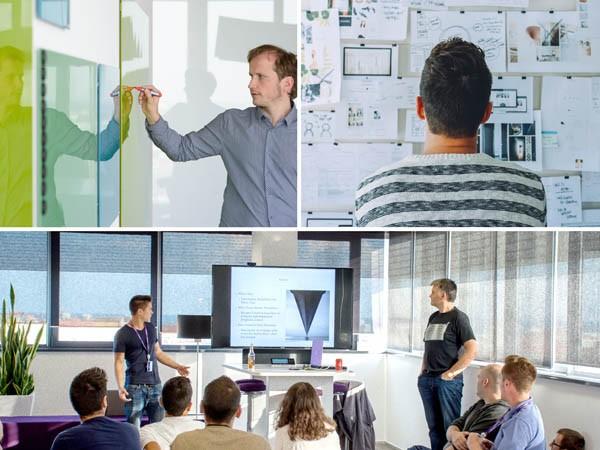Others ask for experience, but we want your passion
Should experience be a predictor of capacity? I think Guardiola would object. This is a good story about an experiment going terribly right: the Netcentric Academy.

A year ago, the Netcentric director from the Barcelona office approached me with a crazy idea (he usually does that during the summer). He said: “Let’s get graduating students from universities and train them to become backend and frontend developers in three months.” He was really optimistic and certain that it would work. I, on the other hand, thought the dates were aggressive. Additionally, nobody had done it before and, as new experiences go, uncertainty leads to fear and rejection. Some colleagues were concerned that junior developers with little or no previous work experience may not have enough of commitment to projects and might risk client relationships. I am glad to tell you that all these fears are now gone and that this story has a happy ending.
So we did not have much time to prepare. I was myself doubtful it was even possible. However, this is Netcentric, and we do things differently. We set to define the classes that were going to be taught, select the professors that were going to teach them, and the plan to follow. We offered two tracks: one for backend and frontend engineers. There were several courses in common dealing with basic development methodologies and project management practices. Experts from the company flew from Zurich and London to provide introduction to the Adobe Marketing Cloud from Analytics to Campaign. For backend we introduced several topics of java and AEM development. Dev Ops also showed the virtualized environment, caching strategies, and some tricks of the trade in maven. The front end classes included a review of their framework based on Node and Gulp. We tried to expose our new colleagues to almost every part of Netcentric so that there is always somebody of reference in case of further questions.
The first major obstacle was the opportunity cost in getting our own developers to teach classes. Therefore, we came up with a solution: let’s leave it open for the students to do their own project. The rest of the time, the students will receive a basic introduction to our building blocks. This decision turned out to be the key of success. The project was the best part of the academy and allowed a good assessment of motivation, teamwork, and learning.
Today, we have more than 20 bright developers that have been onboarded into the company and with a high level of satisfaction from both the tech leads and the developers themselves.
It is not only passion that we asked, of course. Those selected showed a potential for deep analytical thinking and fast learning. They worked under little supervision and were able to be motivated and deliver high quality work in their projects. At the beginning, we debated much about motivation.
Were they able to attend a full 8-hour day of classes? Should we have a 6-hour day? Should we include motivating videos from code.org? Reality sometimes is better than fiction and the students did wonderfully, even arriving an hour earlier to have their daily stand-up and staying late to finish their work. Long story short, we were impressed.
Their level of commitment was astonishing. Some months after completing the academy, alumni were asked about what, specifically, had been their factor for success. Everyone is driven towards their goals by different things so the answers varied. However, the most common response is that they wanted to prove how much they could do. That’s exactly what makes us so excited about the Netcentric Academy - the creativity and determination of young developers to learn and grow. I hope society in general would do the same: give them a chance to show what they are capable of.